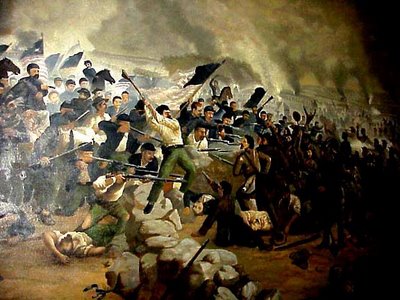
"Some Americans ask me, if completing the mission is so important, why don't you send more troops? If our commanders on the ground say we need more troops, I will send them. But our commanders tell me they have the number of troops they need to do their job. Sending more Americans would undermine our strategy of encouraging Iraqis to take the lead in this fight. . . . As we determine the right force level, our troops can know that I will continue to be guided by the advice that matters: the sober judgment of our military leaders."
As I listened to President Bush's delusional exercise in futility on the Iraq war last night, I was reminded of Pickett's Charge.-- GEORGE W. BUSH, June 28, 2005
That was the disastrous Civil War infantry assault on July 3, 1863, the last day of the Battle of Gettysburg, ordered by Confederate General Robert E. Lee against Union forces on Cemetery Ridge.
The engagement was by far the bloodiest military attack in American history, with over 50 percent Confederate casualties, and a crippling psychological blow to the South from which it never recovered. The futility of the charge was predicted. Lee's commanders argued strenuously against it. It was the turning point in the war and is deservedly known as the High Water Mark of the Confederacy.
Comparisons with Pickett's Charge and the president's plan to send a paltry 22,000 additional troops to Baghdad and Anbar Province, set benchmarks for the Iraqi government and pour more money into the black hole of Iraqi infrastructure reconstruction efforts are, of course, uneven.
But the similarities are stark, notably that Bush's plan:
* Has been disowned by his own brass, who have said that five or six brigades of additional troops will not make a whit of difference except to provide a few more targets. Confronted with this disconnect, the president then brought in new commanders to toe his line.I have to confess that I had difficulty keeping my eyes on the president during the speech. One commentator noted that it looked like he was making a hostage tape.
* Sets up the prospect of additional clashes -- and U.S. deaths -- with insurgents and sectariain militias in the close quarters of Baghdad, most notably the death squads run by Moqtada Al-Sadr, the powerful Shiite godfather and Prime Minister Nuri Al-Maliki's puppet master.
* Goes against the advice of Al-Maliki, who has told the president that it is time for his troops to assume primarily responsibility for security in the capital.
* Runs counter to the Iraqi Study Group's core recommendation -- a phased draw down of troops and increase in civil affairs officers who would train up Iraqi army and police units.
* Is predicated on the canard that Iraq is all about the War on Terror while conveniently overlooking the reality that there were no terrorists in Iraq until the administration botched the post-invasion occupation.
* Is viewed as grossly insufficient by many of his own supporters who are jumping ship in increasing numbers.
* Ignores the message that voters sent the White House in November, as well as public opinion polls showing that only a smalll minority of American support a troop increase.
* Sets up a confrontation with Congress.
* Is not open ended, which sends a signal to Iraqi insurgents that they can simply wait things out if they so choose.
Bush seemed to alternate between grimaces and eye rolls and, well, looked scared as he delivered the news that he was ignoring the American people and the entire body of sage advice that he has gotten in recent weeks and instead was escalating the war.
Did you catch the president's terse saber-rattling aside? That he was not ruling out the possibility of drawing the U.S. into a wider regional conflict and was ordering the deployment of an additional carrier strike group to the region? Are you listening, Iran? Syria? And does the raid by U.S. troops on an Iranian consulate in northern Iraq this morning have anything to do with his threat? (See post below for gory details.)
When I read a transcript of the speech this morning minus the facial tics and other distractions, I was struck by several things:
* His plan might have worked two years ago.There was small bright spot in the speech: The president conceded for the first time that there have not been enough troops in Baghdad to halt the vicious sectarian fighting.
* We've heard it all before.
* Our worst fears about Bush being overmatched are still true.
* Our worst fears about him being a cynic without peer are still true.
* He has staked his credibility against that of practically everyone else who matters in the war debate. And the winner is . . .
* As a veteran myself, I feel for the soldiers on the ground in Iraq and their families and other loved ones. They must feel more isolated than ever.
He stated, although not particularly convincingly, that “Where mistakes have been made, the responsibility lies with me.” And his aides acknowledged in a briefing paper released before the speech that the president's previous strategy was fundamentally flawed in some respects.
But when all is said and done, the president believes that American involvement in Iraq must be increased so it can then be decreased. In Vietnam War parlance, the village has to be destroyed in order to save it, and Iraq is well down that road with the continuing presence of American troops the gasoline that is feeding the conflagration.And so the long nightmare continues.
Like Pickett's Charge, the speech will be viewed as the last gasp of a delusional strategy for a war that will be remembered as the worst foreign-policy blunder in American history. As well as another step in George Bush running out the clock and handing off this immense disaster to his successor.
No comments:
Post a Comment